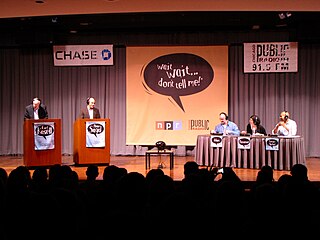
A game show is a type of radio, television, internet, or stage show where contestants regularly compete for a reward. The history of game shows dates back to the invention of television as a medium. On most game shows, contestants either have to answer questions or solve puzzles, typically to win either money or prizes. Game shows often reward players with prizes such as cash, trips and goods and services provided by the show's sponsor.
Who Wants to Be a Millionaire? is an international television game show franchise of British origin, created by David Briggs, Mike Whitehill and Steven Knight. In its format, currently owned and licensed by Sony Pictures Television, contestants tackle a series of multiple-choice questions to win large cash prizes in a format that twists on many game show genre conventions – only one contestant plays at a time, similar to radio quizzes; contestants are given the question before attempting an answer, and have no time limit to answer questions; and the amount offered increases as they tackle questions that become increasingly difficult. The maximum cash prize offered in most versions of the format is an aspirational value in local currency, such as one million pounds in the U.K. or 70 million rupees in India.

An amusement arcade is a venue where people play arcade games, including arcade video games, pinball machines, electro-mechanical games, redemption games, merchandisers, or coin-operated billiards or air hockey tables. In some countries, some types of arcades are also legally permitted to provide gambling machines such as slot machines or pachinko machines. Games are usually housed in cabinets. The term used for ancestors of these venues in the beginning of the 20th century was penny arcades.

Have I Got News for You (HIGNFY) is a British television panel show, produced by Hat Trick Productions for the BBC, which premiered on 28 September 1990. The programme, loosely based on the BBC Radio 4 show The News Quiz, focuses on four panellists divided into two teams – captained by Ian Hislop and Paul Merton – answering questions on various news stories on the week prior to an episode's broadcast. However, the programme's format focuses more on the topical discussions on the subject of the news stories related to questions, and the satirical humour derived from these by the teams. As a result, the style of presentation had a profound impact on panel shows in British TV comedy, making it one of the genre's key standard-bearers.

Family Feud is an American television game show created by Mark Goodson in which two families compete to name the most popular answers to survey questions in order to win cash and prizes.

A panel show or panel game is a radio or television game show in which a panel of celebrities participates. Celebrity panelists may compete with each other, such as on The News Quiz; facilitate play by non-celebrity contestants, such as on Match Game and Blankety Blank; or do both, such as on Wait Wait Don't Tell Me. The genre can be traced to 1938, when Information Please debuted on U.S. radio. The earliest known television panel show is Play the Game, a charades show in 1946. The modern trend of comedy panel shows can find early roots with Stop Me If You've Heard This One in 1939 and Can You Top This? in 1940. While panel shows were more popular in the past in the U.S., they are still very common in the United Kingdom.
The American quiz show scandals of the 1950s were a series of revelations that contestants of several popular television quiz shows were secretly given assistance by show producers, to prearrange the outcome of ostensibly fair competitions. The 1950s quiz show scandals were driven by a variety of reasons, including greed, willing contestants, and the lack of regulations prohibiting such conspiracy in game show productions.
Tiger Electronics is an American toy manufacturer best known for its handheld LCD games, the Furby, the Talkboy, Giga Pets, the 2-XL robot, and audio games such as Brain Warp. When it was an independent company, Tiger Electronics Inc., its headquarters were in Vernon Hills, Illinois. It has been a subsidiary of Hasbro since 1998.
Full-motion video (FMV) is a video game narration technique that relies upon pre-recorded video files to display action in the game. While many games feature FMVs as a way to present information during cutscenes, games that are primarily presented through FMVs are referred to as full-motion video games or interactive movies.

Thomas Raymond Bergeron is an American television personality, game show host, comedian, and actor best known for hosting Hollywood Squares from 1998 to 2004, America's Funniest Home Videos from 2001 to 2015, and Dancing with the Stars from 2005 to 2019.

Winston Conrad "Wink" Martindale is an American disc jockey, radio personality, game show host, and television producer. In his six-decade career, he is best known for hosting Gambit from 1972 to 1976, Tic-Tac-Dough from 1978 to 1985, High Rollers from 1987 to 1988, and Debt from 1996 to 1998.

Spicks and Specks is an Australian music-themed comedic television quiz show. Hosted by Adam Hills and with team leaders Myf Warhurst and Alan Brough, the series originally aired on what was then ABC1 at 8:30pm on Wednesday nights, with the show repeated on Thursdays on ABC2 at 8pm. The previous year's season was repeated every Friday at 2:30pm on ABC1. As of 2021, repeats of old episodes of the show screen at 7:30pm weeknights on ABC TV Plus.

Michael Nicholas Salvatore Bongiorno was an Italian-American television host. After a few experiences in the US, he started working on Italian TV in the 1950s and was considered to be the most popular host in Italy. He was also known by the nickname il Re del Quiz, and the peculiarity of starting all his shows with his trademark greeting: Allegria!.

Buzz! is a series of video games originated by Sleepydog Ltd., developed by Relentless Software and published by Sony Computer Entertainment for the PlayStation 2, PlayStation 3 and PlayStation Portable consoles. They are quiz games that see the players answering trivia questions while competing in the fictional game show, Buzz!. Created specifically with multi-player party gaming in mind, the series launched in October 2005 and to date comprises 18 games; including 13 in the Buzz! series and five Buzz! Junior titles. The series made the transition to the PlayStation 3 with Buzz!: Quiz TV in 2008. The sixteenth game in the series Buzz!: Brain of the UK was released in March 2009. The latest Buzz! game is Buzz!: The Ultimate Music Quiz which was released in October 2010.
The Price Is Right is a television game show franchise created by Bob Stewart, originally produced by Mark Goodson and Bill Todman, and currently produced and owned by FremantleMedia. The franchise centers on television game shows, but also includes merchandise such as video games, printed media, and board games. The franchise began in 1956 as a television game show hosted by Bill Cullen and was revamped in 1972. This version was originally hosted by Bob Barker. Since 2007, Drew Carey has hosted the program.

Carmen Sandiego is a media franchise based on a series of computer games created by the American software company Broderbund. While the original 1985 Where in the World Is Carmen Sandiego? video game was classified as a "mystery exploration" series by creators and the media, the series would later be deemed edutainment when the games became unexpectedly popular in classrooms. The franchise centers around the fictional thieving villain of the same name, who is the ringleader of the criminal organization, V.I.L.E.; the protagonists are agents of the ACME Detective Agency who try to thwart the crooks' plans to steal treasures from around the world, while the later ultimate goal is to capture Carmen Sandiego herself.

Haruhi Suzumiya is a Japanese light novel series written by Nagaru Tanigawa and illustrated by Noizi Ito. It was first published in 2003 by Kadokawa Shoten in Japan with the novel The Melancholy of Haruhi Suzumiya, and has since been followed by 11 additional novel volumes, an anime television series adaptation produced by Kyoto Animation, four manga series, an animated film, two original net animation series and several video games.

Whose Line Is It Anyway? is an American improvisational comedy television show, an adaptation of the British show of the same name. It aired on ABC and ABC Family from August 5, 1998, to December 15, 2007, hosted by Drew Carey. A revival of the show, hosted by Aisha Tyler, began airing on The CW on July 16, 2013.
Jeopardy! is an American media franchise that began with a television quiz show created by Merv Griffin, in which contestants are presented with clues in the form of answers, and must phrase their responses in the form of a question. Over the years, the show has expanded its brand beyond television and been licensed into products of various formats.

Mazinger Z is a Japanese super robot manga series written and illustrated by Go Nagai. The first manga version was serialized in Shueisha's Weekly Shōnen Jump from October 1972 to August 1973, and it later continued in Kodansha TV Magazine from October 1973 to September 1974. It was adapted into an anime television series which aired on Fuji TV from December 1972 to September 1974. A second manga series was released alongside the TV show, this one drawn by Gosaku Ota, which started and ended almost at the same time as the TV show. Mazinger Z has spawned several sequels and spinoff series, among them being Great Mazinger, UFO Robot Grendizer and Mazinkaiser.












